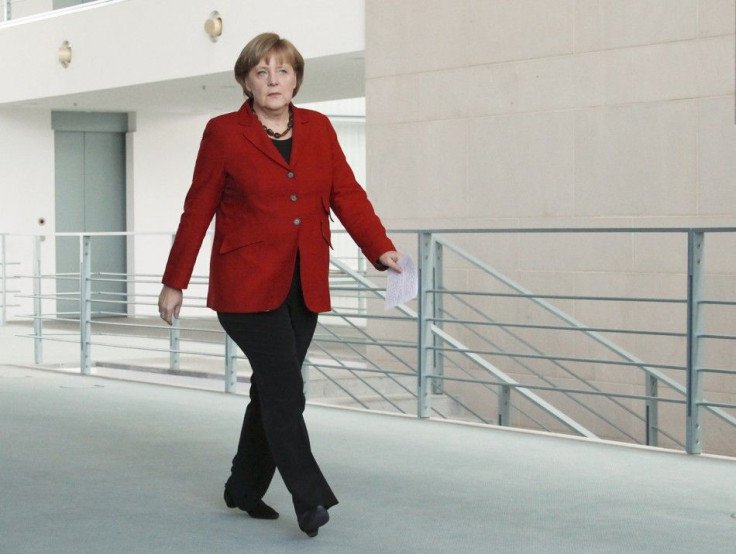Merkel Seen Easing Stance Against Aid For Struggling Banks

German Chancellor Angela Merkel appears to have altered dramatically her long-held opposition to euro zone nations sharing responsibility for the debts of the monetary union's most troubled banks.
Specifically, Merkel hinted Monday that she would be amenable to supporting a bad bank bailout structure, in which the most toxic part of bank balance sheets would be pooled, bought by the European Central Bank (ECB) or some other international institution, and wound down over a 25-year horizon.
The hint of a change in Merkel's position is key because Germany, the euro zone's No. 1 economy and the only member state with enough economic power to bankroll many bailout options, is considered the veto power in decisions regarding the monetary union's sovereign debt crisis. Until Monday, German officials had not been shy about exercising that veto option, shooting down the notion that the crisis could be solved by issuing euro zone-backed Euro bonds to replace sovereign obligations or by implementing Continent-wide deposit insurance.
That opposition was on full display last Wednesday, after the European Commission made a surprise recommendation that the 17 countries of the monetary union create and fund a banking union for bailing out insolvent banks, pre-empting the fiscal and political stresses such actions have on individual national governments; it took 90 minutes for German officials to nix the idea. A German government spokesman told a regularly scheduled meeting that his country's objections to the funding mechanism for such an idea is well known.
A few days later Merkel repeated her opposition to any scheme that collateralized foreign debt obligations by putting German taxpayers on the hook in a meeting of her Christian Democratic Union political party. She said that under no circumstances would she consent to a Euro bond regime. Not that she needed to stress the point: The German constitutional court has already found the government does not have the power to approve such a plan without amending the nation's founding document.
Yet surprisingly, on Tuesday of this week, after Merkel met with EU Commission President Jose Manuel Barroso, she said the two talked about more Europe. Merkel's more Europe comment has been seized on by analysts to suggest she is warming up to a lite version of the Euro bond solution. Specifically, Barroso and Merkel discussed establishing a supervisory framework for the biggest banks in the larger, 27-member European Union and incorporating elements of the banking union idea that had been discussed the previous week, according to several published reports.
Over the past two weeks there have been harbingers of a shift by Merkel. The German media has been buzzing with rumors that the Chancellor is about to endorse a plan introduced last year by the German Council of Economic Experts, a non-partisan government body known in Germany as the council of wise men -- there is one female member -- which would essentially introduce that alternative, namely a lite Euro bond. The plan would transfer nearly $3 trillion in debt into a commonly collateralized fund. It would not be an open-ended obligation, like a true Euro bond, but would still have negative direct effects on Germany's creditworthiness.
We have the impression due to conversations with government officials that the government is really examining the pact and the proposals, Wolfgang Franz, an economics professor at the University of Mannheim and the chairman of the council, told The New York Times on Monday.
If I reject euro bonds, if I reject the European Central Bank, we don't have many measures other than hope.
Part of the reason Germany might be looking to turn back on its hard-line positions of the past might be the fact the country's leadership sees itself more and more isolated from intellectual allies, and is now being openly perceived as obstructionist. Last Friday, both Italian Prime Minister Mario Monti and ECB President Mario Draghi criticized Merkel's stance. Draghi, in particular, has previously stood solidly with Merkel.
On Tuesday, an unnamed senior G7 source told Reuters that a session that day of the finance ministers of that powerful policy bloc was set to turn into a Germany-bashing session, with other partners pushing Berlin to cave.
© Copyright IBTimes 2024. All rights reserved.




















